
Background information
Why the 10-per-cent rule in jogging is actually wrong
by Siri Schubert

Boosting strength, fitness and health in virtually no time? That’s what Swiss fitness provider Aurum claims to offer. Can it work? My first impressions are positive, but there’s a catch.
A six-minute training session that delivers weight loss, muscle gain and better health? Sounds good. Maybe too good to be true. Either way, claims like these catch my attention. So, I applied for two free taster training sessions at fitness company Aurum, which is currently opening a host of new studios across Switzerland and Germany. My first experience made me want more. But one thing at a time.
A lot of people love strength training. I’m not one of them. I find controlled movements in rooms filled with machines and people boring. I prefer to get outside and paddle, run, cycle or swim (I’ll be writing about this regularly in the future). The time commitment required for conventional strength training on machines is too much for me and the results aren’t enough. This means I find it hard to motivate myself and always end up letting it slip – despite good intentions.
This is despite knowing how important strength training is for performance and health. It doesn’t only apply to top athletes. The skeletal muscles communicate with multiple organs (in German) via messenger substances and have a considerable effect on weight, metabolism, wellbeing and health.
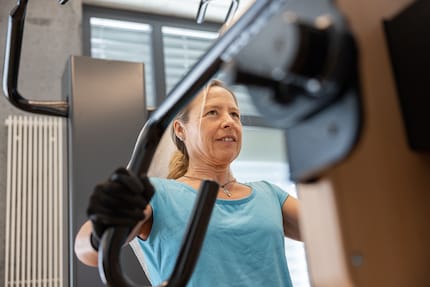
According to this article by Dr Claudio Viecelli, biologist at the Swiss Federal Institute of Technology (ETH) and Galaxus contributor, strength training is essential to stay fit as we age. Sarcopenia – age-related loss of muscle mass – which was long thought to be unstoppable, can be reduced with strength training. The same is true of osteopenia, loss of bone mass.
In contrast, strength loss accelerates biological ageing and has been described as «the new smoking». This is where training with weights comes in. There’s no doubt about it: working muscles via targeted exercises has a lot of benefits – for everyone, regardless of gender, fitness or age.
Aurum’s training concept is based on high-intensity training. In just six minutes per week, you’re said to be able to train all of your main muscle groups. Sounds good. I can definitely manage that over a longer period of time. Because results won’t happen overnight, even with high-intensity training.
High-intensity training has been researched for a while. Scientists at the Swiss Federal Institute of Technology have developed a prototype that enables personalised high-intensity strength training. My colleague Patrick Bardelli has already tested it.
Strength training is really complex (in German), and research into many areas is still in its infancy. There’s a good deal of evidence that strength training with high loads leads to increased strength. Whether that outranks training with weaker loads is currently a topic of scientific interest, as shown by the article Go heavy or go home?.
There’s no clear consensus on whether and the conditions under which types of training differ in terms of increasing strength and muscle mass – hypertrophy. A meta study determined that training with heavy weights increases maximum strength to a greater extent, while muscle growth (hypertrophy) is similar when training with heavy and lighter loads to muscular failure.
Basically, for training to be effective, it has to exceed a certain intensity threshold, which in turn provides a specific stimulus. Adaptation to the load occurs during recovery so the muscle is able to withstand a higher load during the next training session. The more intense the training, the narrower the scope and lower the frequency should be. Otherwise, instead of strength and muscle growth, overtraining will result in fatigue and a drop in performance.
High-intensity strength training involves lifting weights between 75 and 100 per cent of a person’s maximum voluntary force (1 RM – repetition maximum, i.e. a weight that can only be lifted once). This should make it more effective than performing more reps and using lighter weights. According to some studies, training at the limit also improves the interaction between nerves and muscle fibres.
However, high-intensity strength training on conventional machines or with free weights has its pitfalls for non-professional athletes. Even just testing maximum strength is a challenge, as fitness varies on a daily basis. Training with heavy weights can also increase the risk of injury, and muscle fatigue over the course of training can make real maximum strength training difficult. The strength training Aurum offers starts between conventional machines and the highly specialised equipment of the Swiss Federal Institute of Technology. The software-controlled device claims to offer customers individual maximum strength training with a reduced risk of injury in a short period of time.
My first appointment at Aurum is scheduled for 40 minutes instead of six. With a health check, a briefing and machine setup to get through as well, that’s fine. When I enter the studio, I’m pleasantly surprised. What I didn’t know was that I’m the only customer and I have the fitness equipment and trainer Sara Silva all to myself.
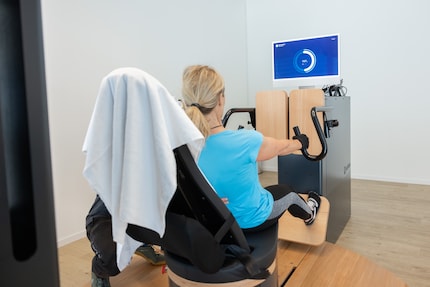
She explains the training device to me: it’s a modern machine with wood and matte black painted steel which stands in the otherwise almost empty room. I like it. I don’t feel cramped or distracted by comparisons or the slamming of the dumbbells that’s a common background noise in gyms.
The Aurum machine contains six workout stations in one: leg press, rowing machine, bench press, torso extension, pulldown, and shoulder press. «With each exercise, the resistance you use to push or pull against it is adjusted so that you’re always exercising with maximum effort,» explains Sara. «With other machines, you tense your muscles and then relax them again,» she says. «With this method, you have to keep the tension the whole time.» Paloma Colet, franchisee of the studio, adds: «The training is always personalised and highly focused. My oldest client, who’s 81, trains to her personal maximum just like younger people or athletes.»
Before each exercise, Sara sets the machine to my height and adjusts it so that I have an effective range of motion without hyperextending my joints. This reduces the risk of injury. The settings are saved in the software and can be called up during the next training session.
At Aurum, the idea is that I do every exercise for one minute, e.g. the rowing machine or the leg press. This ensures that I train in the concentric phase (basically contracting the muscle), the eccentric phase (stretching the muscle) and the isometric phase (with constant counter-holding) with the highest possible intensity for me. Theoretically, I’m always training with maximum strength. A green circle on the monitor will show me later whether I manage to surpass the load of the previous session. «Keep it up,» Sara encourages me. «Keep going». It’s not easy: I give it everything until my muscles tremble and I have to concentrate fully during the exercises. No pain, no gain after all.
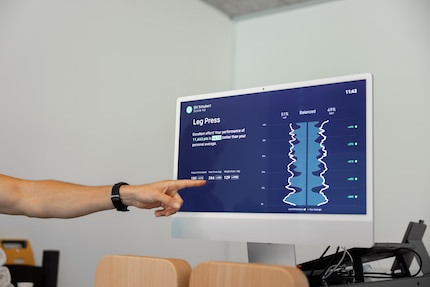
After each exercise, the monitor shows me my performance curve, which looks like an abstract Christmas tree. That makes sense, because the further each minute of training progresses, the less strength I can muster. As well as the performance curve, there are other key figures such as the right-left symmetry and a score for my training, which I should try to beat next time if possible. There are also measured benchmarks that show my progress, if there is any.
There are more measurements during my second trial session. The body scanner shows my muscle mass, body fat and water levels. It remains to be seen whether the values are correct or not in absolute terms. At least they’re a good starting point to see how the values are shifting – they’ll be measured again in three months if I keep at it.
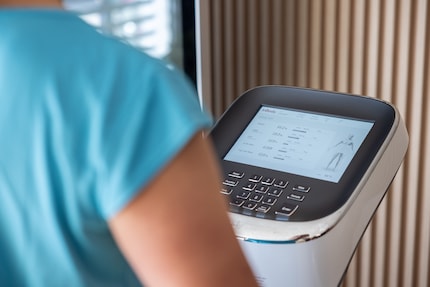
This time it’s a trainer who guides me through the exercises, corrects my posture and, above all, motivates me. In fact, I’ve improved with every exercise, but it has nothing to do with an increase in strength. It’s because I’m now more familiar with the process and pressure curve of the machine. In any case, I feel exhausted and satisfied after training. The fact that my total score is almost 26 per cent higher than the first time is motivating and an ego boost. Secretly, I’m hoping for sore muscles so I can feel that I’ve really exhausted myself.
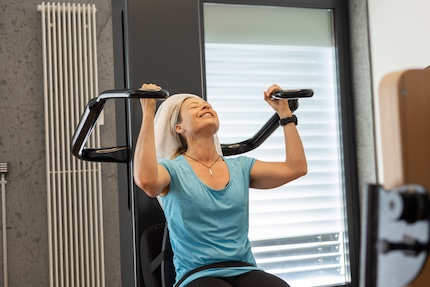
And the catch? The price. It varies from studio to studio at Aurum, but it’s significantly higher than a typical gym membership. There are reasons for this. You’re training on a technically innovative piece of equipment that’s very efficient if it delivers what it promises. You’re also saving time and are alone in the studio, with no waiting times or distractions. The software is tailored to you and you’ll be personally looked after during each exercise – like having a personal trainer. The body scan – which measures changes every three months – is included. A shower, towels, shower gel, shampoo and conditioner are also provided.
Of course, everything has its price and it’s certainly worth the money. Personally, the step up to an annual membership for the Aurum studio in Zurich is too big for me at 2,749 francs. In my case, the fact that it’s recognised by health insurance companies offers little consolation. I’ve compared it with standard fitness studios in the area. The annual subscription at GymOne – which offers conventional training on machines and group fitness classes – currently costs 890 francs. The Fit annual membership at Fitnesspark (in German) with sauna and pool access, where available, costs 1,250 francs. At the Zurich West Pure Gym, the Core annual membership costs 549 francs plus a registration fee of 20 francs. These are all only rough comparative values that are currently listed on the websites and don’t take into account additional services, group fitness classes and the like.
Nevertheless, the Aurum concept fascinates me, and my stints at other fitness studios never lasted long. Now I want to know if this type of training will deliver the progress I’m looking for and keep me going. That’s why I’ve decided to start with a 10-session card for 899 francs. With one training session per week and the two trial sessions, that gives me a total of three months. Then I’ll see if the body and strength analysis shows significant progress and if I want to continue. Who knows, maybe I’ll become a strength training fan after all.
Research diver, outdoor guide and SUP instructor – I love being in, on and around water. Lakes, rivers and the ocean are my playgrounds. For a change of perspective, I look at the world from above while trail running or flying drones.
Interesting facts about products, behind-the-scenes looks at manufacturers and deep-dives on interesting people.
Show all
Background information
by Siri Schubert

Background information
by Claudio Viecelli

Background information
by Claudio Viecelli